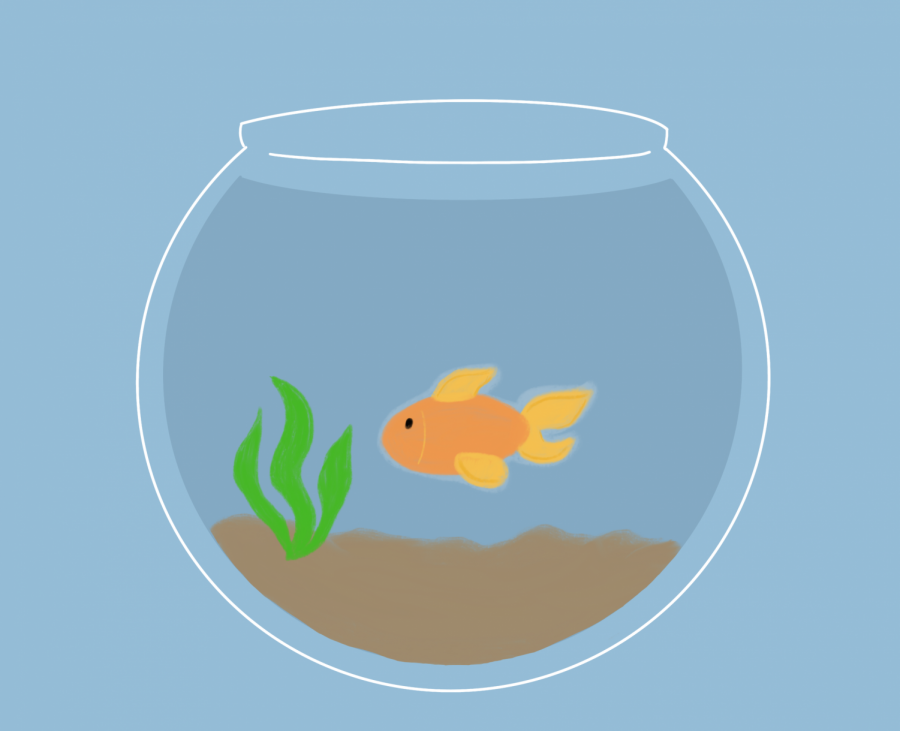A Pitt student’s guide to buying the perfect fish
Shruti Talekar | Senior Staff Illustrator
Fish are a popular pet choice among college students.
June 28, 2021
One of the best things about going to college is that you have free reign over what your room is going to look like — no matter where you live. It’s a clean slate in a way, compared to our childhood bedrooms which are painted in a garish neon green or pink we insisted on as 11-year-olds.
One of the more drastic steps you can take in your college journey is getting a living, breathing companion to share your space with. I’d suggest holding off on getting a dog or a cat. One, they’re not allowed in the dorms, and even once you move out you don’t want to be scooping soiled kitty litter with a Sunday morning hangover in your small South O apartment.
Fish, on the other hand, rank pretty high on the list of low-maintenance pets, and they don’t require much except a clean and filtered tank and the occasional feeding of fish flakes. Besides, they’re really pretty to look at.
Karen Lukacsena — co-owner of Elmer’s Aquarium, which is located in Monroeville about 20 minutes east of Oakland — said fish are popular with college students because they’re relatively easy to care for and they make therapeutic decor.
“I can imagine if you’re a student when you have to study and you’re sitting there if you have a real natural, relaxing aquarium, that it can be very soothing,” she said.
What kind of fish should you get?
Lukacsena said for first-time fish parents there are a few kinds of fish you should think about adopting. Her first suggestion is a betta fish, a commonly sold fish that you can find in pretty much every pet store for about $10 on average. Bettas should be set alone in a five gallon tank.
“Get a single male betta. You have a single fish, maybe some snails, and have a lot of plants,” she said. “It’s a nice five gallon tank with a good filter, nice lighting and that makes it as close to the fish’s natural setting.”
Most fish aren’t going to be well suited to the small spaces you have to work with as a college student. But if by chance you happen to have more spare room for a tank larger than five gallons, you could try for some “tetras” or a school of “barbs” that like to hang out in groups of three or four and require a 20 to 29 gallon tank that will probably cost about $100 to $150.
What size tank do you need?
Well, it all depends on the size of the space you’re dealing with. Most people walk into a pet store and start by shopping for the kind of fish that they want. This isn’t really an efficient way of doing things.
Because you could go on and on and on about how you’d love to have a clownfish, but chances are you don’t have the space for a saltwater aquarium and all the set-up it requires.
So before you go looking for a fish, Lukacsena said you should first think about the amount of space you have in your room. You want your fish to be happy and healthy, with the right amount of space they need, because some small fish can live up to three years, Lukacsena added. Larger fish, such as the barbs, angel fish or cichlids can live upwards of 10 years.
What other equipment should your tank have?
Many times people make the mistake of getting plastic plants only for their fish tanks. It’s much better for your fish if the plants in their aquarium are alive and active. Lukacsena said this helps with the filtering process, by making sure the water stays clean. She also said natural plants help with tank maintenance because they create natural oxygen.
Besides these natural plants, getting a proper filter is a must for your tank. It’s the best way to make sure the habitat is clean and scum-free. Lukacsena suggested getting a filter that corresponds with your tank size, but you could even go up a couple sizes for more cleaning power. Filters range in price depending on tank size, but start at around $10 for small fish.
With a tank full of a fish or two and some snail or plant companions, Lukacsena said your fish-keeping venture can quickly become a hobby, because of the relaxing rhythms of fish care, something that college students always need.
“You’re actually inviting nature into your environment,” she said. “I think it’s fun, it’s entertaining and relaxing.”








